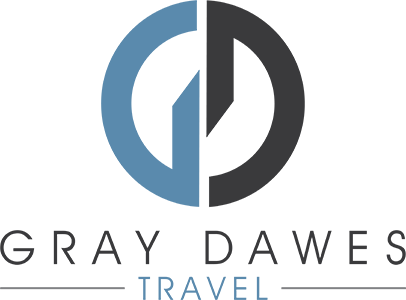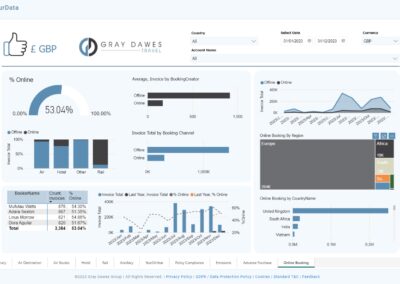WE CAUGHT UP WITH OUR HEAD OF IT OPERATIONS, COLIN KENT
It wouldn’t be too outlandish to suggest that Colin’s IT career started in the seaside arcades of Margate. As a schoolboy, the strobing sights and 8-bit sounds of the burgeoning video game scene helped to ignite his passion for computers – a passion that blossomed into a profession.
Now Head of IT Operations at Gray Dawes, Colin has had a long and varied career defined by the rapidly changing face of technology. In this article, we chat with Colin about his day-to-day responsibilities as the Head of IT Operations at Gray Dawes Travel, his ultimate career highlights, and what it takes to be a leader in the industry.
Hi Colin. Tell us what you do as Head of IT Operations.
My role involves implementing and managing technology to support the wider company strategy and goals.
It’s a role that requires a mixture of different skills: You have to have a very good technical understanding, the skill to lead a team, and an ability to talk to different stakeholders because you have to interact with quite a few people across various areas of the company at all levels.
Like a lot of the technical team at Gray Dawes, I might look like a swan gracefully gliding across the surface of the water, but underneath my legs are furiously working to keep pace with the speed in which technology moves and develops. It’s a fast-paced role for sure.
IT Career Stats
%
The % of surveyed software developers who use Javascript as their main coding language in 2024.*
The increase of Gen-AI related job postings in the industry between Jan 2023 and Feb 2024, according to Indeed Hiring Lab.
the approximate number of IT professionals employed across the European Union, a fifth of whom reside in Germany.**
Tell us a little about your career before coming to Gray Dawes.
When I left school, I wasn’t particularly academic. This is partly because my school years coincided with a time when video games and arcades were all the rage.
It was a glorious era, one I don’t think we’ll see the likes of ever again. So much of my youth was spent in and around arcades, playing video games. There used to be an initiative during the school holidays that allowed students to travel to Margate for £1. So I’d save up £20 – and £20 was a fortune back then – and head to Margate, which had all the best arcades, and just play games all day.
This coincided with the introduction of personal computers in the home. As a result, my interest in arcade gaming led to an interest in computing. It was a hobby which clicked with me immediately. It just made sense. I was also lucky that I have had a computer in the house since my early teens.
So when I started work, I just naturally gravitated towards the technical side of life. My first role was many years ago, selling tech in one of the big box stores. Then I managed to get a role in London installing the workstations of city traders, my first proper IT role, and I’ve been in the industry ever since.
Describe a typical work day in your role as the Head of IT Operations
As a team, we try our best to automate everything and make sure systems run as smoothly as possible, but there are still – and always will be – several routine and manual tasks that have to be done.
I try to complete these manual tasks in the morning. They normally take me around an hour and usually involve checking the status and health of specific systems. It requires a lot of care and attention to ensure our technology is operating as it should.
From my perspective as someone based in the UK, these systems have been working all day and all night as operations pass from the UK to Australia to the US, and so on. As a result, there are a number of Teams messages and emails I pick up as soon as I log in for the day.
The first hour of my working day is the only crossover I get with the Australian office. So, if the Australian teams need any support, that usually happens in hour one. As a result, the first part of my day is usually the busiest, with all the critical, time-sensitive requests done and dusted well before we hit late afternoon. That’s when I usually work on longer-term projects that need a little more attention.
I attend a lot of meetings, too, and all of us in the team are constantly learning. I therefore offer a certain amount of hands on support to those in the team, developing their skills and helping them take on more responsibility. When I log off after a long day, I take the dogs for a walk to decompress.
How has your workday changed from the start of your career until now?
Obviously my team and I work with technology which is constantly changing. However, the biggest change in terms of the way I work is the fact that people are now contactable and able to be online 24/7.
As part of the management team, I’m always ready to respond to critical, “priority one” situations. These relate to a significant offline of systems that affect the company as a whole. This is rare, but does happen from time to time.
When a notification like that goes off on the phone, it doesn’t matter where I am or what I’m doing, I need to pay attention. That doesn’t mean I can’t get on with my life – I’ve had to respond from the pub once before!
I remember when I worked up in the city years ago. I had a pager which would sometimes buzz with a phone number I needed to call on urgent business. Mobile phones were not a thing back then, and I would have to physically go and find a payphone somewhere – unfortunate if you were travelling on an underground train at the time. The pager had a habit of not buzzing if there was bad reception. That’s not the case with phones nowadays. Plus, you can’t get away with pretending not to have received a message as people can now see when you’ve read it.
What role did you and your team play in helping Gray Dawes clients navigate the recent closure of Heathrow Airport?
It’s an interesting question, and something I’ve recently discussed with my boss, Sophie Taylor, our Chief Technical Officer (CTO). Since Sophie joined Gray Dawes, she was very keen to promote the idea of being a cloud-only company and to stop relying so heavily on physical infrastructure.
As a result, everything we do is stored in the cloud. It’s resilient and endlessly scalable, so it’s perfect for our organisation’s growth and ambitions. What happened at Heathrow was not due to a lack of resources or insufficient power; it was essentially a failure of infrastructure, one that offered us a brilliant opportunity to demonstrate the benefits of our cloud-based systems.
I was made aware of the closure well before I officially logged in for the day, as my phone was pinging for hours. We knew that the Australian team had come online and were staying online later than they normally would. We also knew that there was going to be a significant increase in the number of customer contacts we were going to have that day. So one of my team members, Grant Bradley, who deals with the service delivery side of our department, contacted our Operations team first thing that morning to offer our assistance.
We geared ourselves up for an increase in the number of IT support tickets we would be receiving due to the amount of incoming communications that were coming our way. However, what transpired was a showcase of all the previous years of work implementing a flexible and robust cloud-based system.
It scaled perfectly. There were triple the number of incoming calls that day and, quite honestly, the system barely batted an eyelid. There were no issues with lag or latency. There were no problems with calls being dropped. The system did exactly as it was designed to do and allowed our Ops team to take an increased volume of calls without breaching any of our SLAs in terms of response times etcetera.
As a result, we were able to deliver an extremely high level of customer service. This extended not only to our clients but even to other travellers in the same situation whose own TMC was struggling to keep up with developments, whether it be because of time zone differences or inflexible infrastructure. It really was a demonstration of our brilliant service!
What is your favourite part of your role, and do you have any specific career highlights?
There are several parts of my role that I find enjoyable. At its heart, my job is all about solving problems for people. That’s what we as a team do. It’s fulfilling to be asked for help and being relied upon to fix complex issues that other people can’t. You can make a difference, and that’s something that makes you feel all warm and fuzzy inside!
In terms of my career highlights, I would say it’s when I moved into a managerial role. That was important for me personally, even though it might have been boring for everyone else! I haven’t invented anything, I don’t do anything super. I’ve never saved anyone’s life, at least not that I know of. But for me, being able to use my skills in a more senior role is very, very rewarding.
As I get older, one of my favourite aspects of my role is mentoring people and helping them to go on and achieve better things. I follow all of my team members past and present on LinkedIn, and whenever they post updates, I don’t just click the “congratulations” reaction button; I make time to message and speak to them.
We do stuff like this a lot at Gray Dawes. I try to encourage my team to take on as much responsibility as I think they can handle to develop as far as they can. I also try to give them the confidence to be more vocal and free-thinking to help them become well-rounded professionals.
What advice would you give people that want to break into the business travel or IT industry?
It’s a common misconception, especially among younger people interested in the technology sector, that everything is purely about the tech itself. They might be thinking about what the best technology is, learning everything about the software or gadgets billed as the next big thing, but forget to consider what business is really about.
It’s not about the best technology, it’s about what technology is best for the business. There might be a thousand System Admins who can talk in binary, which is lovely, but it doesn’t help anyone. So my biggest piece of advice for anyone wanting to break into the technology or IT industry is to learn how to identify problems and figure out what they can do to resolve them. If you can do that, then you’re already one step towards a successful career.
Get Deeper Travel Insights With YourData
YourData provides you with full and detailed reporting, covering every area of travel spend. This ensures complete visibility of your travel programme and highlights any areas of opportunity for improvement.
Powered by Microsoft Power BI, data reports and analytics can be accessed online through a secure individual login or via monthly PDF reports sent to each of your budget holders across the company, helping you monitor performance live against agreed KPI’s.
Finally, a few quickfire questions…
Favourite place you have visited?
My wife has a fear of flying, and travelling by car has been joyless for decades now! So I’m not going to suggest I’m some sort of globetrotter. However last year we went to Cyprus for a close friend’s wedding. It was the first time in our relationship of more than 30 years that my wife and I travelled alone with no children. There were long walks, lovely beaches, and, with my phone well and truly off, a total sense of peace away from any stress or concerns. It was such a nice time away, that my wife has agreed to fly somewhere again next year, so I’m looking forward to taking more holidays abroad.
Any interesting hobbies or stories?
I don’t really have any hidden talents as I’m not the sort of person that can keep a secret for long! I’m 55-years-old which makes me the oldest boxer at my local amateur boxing club. I train 1-2 days a week and very keenly follow the club and all of its boxers. It’s a non-profit club run for the benefit of the under privileged youths in the area, and I am extremely proud of the club and the work it does.
We often host charitable boxing shows where many of the younger boxers get their first chance to fight for “skills”; in other words, it’s non-point scoring, and there are no winners or losers. Some of the older boxers get to compete competitively, too. While I’m too old to compete (luckily for me), I do help to set up the venue and, alongside my wife, provide food to the officials who are giving up their time for free.
Favourite food and drink?
My favourite drink is beer, and my favourite food is whatever I can eat with beer.
Related Articles
How to Pack Like a Business Travel Pro
After a long journey, there’s nothing more frustrating than needing one item from your suitcase, only to discover it buried beneath everything else. Business travel is full of tight schedules, back-to-back meetings, and unfamiliar cities to navigate, so ensuring that...
The Practical Guide to Maximising Traveler Wellbeing
How can you keep your travellers happy before, during and after a trip? What steps can you and your TMC take to ensure that their experiences on the road are healthy and relatively stress-free? In this practical guide to traveller wellbeing, we take a deep dive into how travel bookers can better support employees both away on a work trip and when they come home.
Paris: A Business Traveler’s Guide
Nestled on a north-curving arc of the vast river Seine, Paris is renowned the world over for its history-rich streets, its devotion to fine art and fashion, and its unrivalled menu of gastronomic delights, from melt-in-the-mouth croissants to the sweet taste of French onion soup. The city and broader Paris region is also a significant economic and diplomatic powerhouse at the heart of Europe – its nominal GDP of ~£640 billion in 2021 was the highest in the entire European Union, and 29 companies listed in the Fortune Global 500 call the area home. In this comprehensive guide to Paris for business travellers, we delve deeper into navigating the city’s unique corporate landscape, offer our top tips for getting around, and pick out our top 3 things to see or do to make your trip unforgettable.
LET’S TALK
Fill in the form below and we’ll get back to you as soon as we can.







